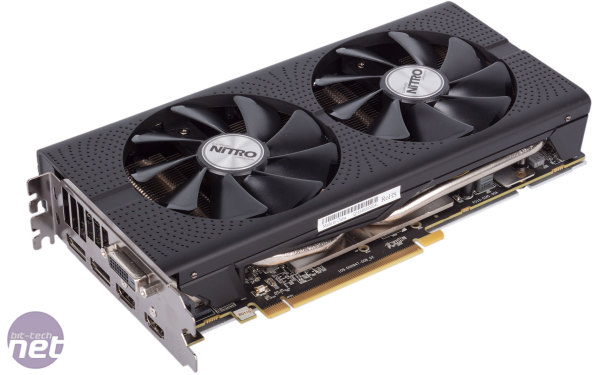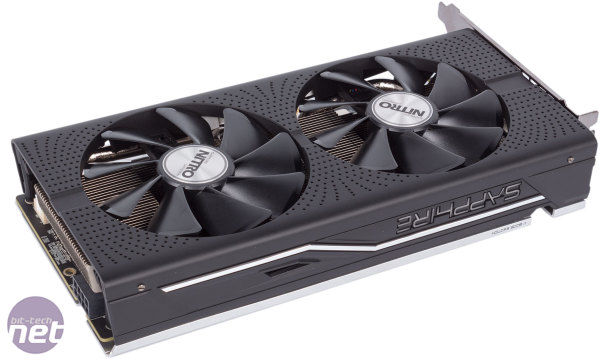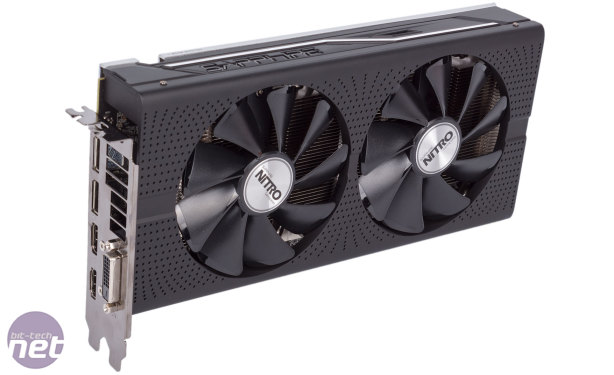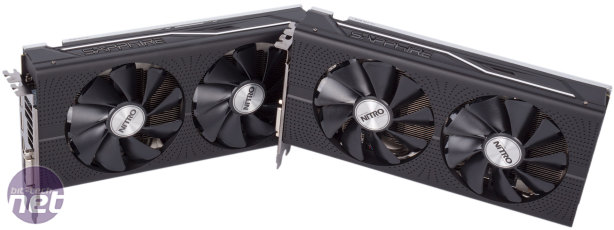Sapphire Radeon RX 480 Nitro+ OC 4GB and 8GB Reviews
November 24, 2016 | 10:08

Performance Analysis
The general performance of these cards is the same as you'd get from any RX 480. The cards both make light work of 1080p, powering through modern games with maximum settings at smooth frame rates, often without ever dipping below 60fps. Even 1440p is handled very well, although in Fallout 4 and Deus Ex the minimum frame rate can dip below 30fps, so some games will benefit from dropping from 'Ultra' to 'High' settings or the equivalent.The 8GB card is 5 percent quicker on average at 1080p and 1440p than the 4GB card, increasing this margin to 7 percent at 4K, although it's only really Battlefield 1 and Deus Ex at this resolution where the memory actually appears to be a bottleneck – remember the 8GB card is clocked higher on both the core and memory. As such, 4GB still doesn't appear to be a real limit at realistic resolutions, although it may well become one in the future (especially at 1440p). Sapphire's 8GB card also emerges as ever so slightly faster than Asus's Strix card on average. Meanwhile, the RX 480 Nitro+ OC 4GB is only 6 percent quicker on average than the RX 470 Nitro+ OC 4GB, though that's mainly down to AMD not leaving much of a performance gap between these two GPUs.
When comparing to Nvidia equivalents the results are very game-dependent. Sapphire's 8GB card trumps a Founders Edition GTX 1060 6GB by 7 percent on average, but this misses a lot of nuances: In Fallout 4, for example, Nvidia actually has the upper hand by a fair margin, and in the other DirectX 11 title, the Witcher 3, the cards are neck and neck. Vulkan performance in Doom clearly goes to AMD, and DirectX 12 tends to favour the red team as well with higher than average leads in Deus Ex and Total War, although it's not consistent as the narrower performance gap in Battlefield One shows. In these new APIs, it really will come down to the specific features leverage by game engines and how well optimised drivers are. That said, the 4GB card is considerably faster than an overclocked GTX 1060 3GB. Doom and Deus Ex increase the average lead it enjoys considerably with average frame rates here being at least 25 percent faster for Sapphire and in one instance over 60 percent higher. This suggests that 4GB is a much better sweet spot than 3GB for modern APIs at 1080p and/or with 'Ultra' settings.
Power consumption is roughly in line with what was expected after we saw Sapphire RX 470 Nitro+ 4GB – the 4GB RX 480 increases power consumption a little over that card and the 8GB adds a bit more too. From a pure efficiency perspective, Nvidia is clearly the victor with its Pascal GPUs. Asus, too, as a board partner, seems to be much more efficient than Sapphire as its Strix 480 8GB consumes considerably less than these two cards.
Temperatures, meanwhile, are healthy, but not outstanding – in fact, they're about the same as what you'd get with a reference card. The real benefit of the custom cooler, then, is noise: The fans, under load, peaked at 39 percent (roughly 1,600 RPM) at which point they were emitting a quiet hum – still audible, but much less so than the reference card.
Observing clock speeds during testing, the 8GB card fluctuated a fair amount. Despite being clocked to 1,342MHz boost, it rarely went above 1,300MHz and sometimes dipped to around 1,210MHz. The 4GB card was better, however, consistently at 1,280MHz or above, despite having the lower boost clock speed (1,306MHz). Both cards are power limited – increasing the power limit in overclocking software sees the boost speeds maintained without effort. As such, it's possible the higher amount of memory and faster memory clock speed on the 8GB card eats into the power limit such that less is available for the core.
Overclocking did yield some healthy performance improvements, partly because of the better clock speeds but also the increased power limit. The 8GB card improved by between seven and 11 percent, while the 4GB card went up by between four and eight percent, surpassing the stock performance of the GTX 1060 Founders Edition and the Asus RX 480 Strix OC 8GB in the process. However, overclocking these cards to the max does involve a significant increase to the power limit and voltage. This saw system power consumption increase by over 100W in both cases, and the added load on the cooler was clear: The fans were now peaking at 63 percent (about 2,300 RPM), making them much louder and more intrusive. We'd probably play it safer with a more moderate overclock, as the RX 480 is inefficient when pushing it beyond normal levels.
Conclusion
Brimming with features, tidily built and with a cooler that is a marked improvement on the reference design, the Sapphire RX 480 Nitro+ cards are an attractive proposition. They're frequently listed as popular or hot sellers on etailer website and it's easy to see why, as the pricing is also very reasonable: less than 10 percent higher than the least expensive models in both cases. The dual-HDMI ports, RGB lighting, backplate and quieter cooler with semi-passive capabilities makes this a very good deal indeed, and both cards are easy to recommend in place of the reference design.Cards like the Asus Strix one offer even greater cooling prowess, better efficiency and advanced features like FanConnect, but Sapphire still keeps pace on many fronts and in performance terms there's nothing between them. The RX 480 generally is also well positioned against Nvidia's competing GTX 1060 cards in many regards, especially in performance in new APIs, and the RX 480 4GB does appear to benefit from its extra 1GB of GDDR5, even at 1080p.
The 4GB card offers the best bang for buck, as the larger frame buffer of the costlier model doesn't really show any advantage until the GPU is being pushed so hard that it's irrelevant (e.g. at 4K ultra). Whether this will continue to be the case going forward is hard to say. Whichever you opt for, both cards are currently very well positioned in the market and would be our top picks for anyone with £200 or £250 to spend on graphics hardware.


MSI MPG Velox 100R Chassis Review
October 14 2021 | 15:04












Want to comment? Please log in.